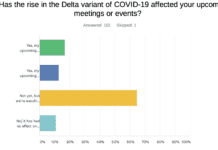 More than 100,000 attendees from around the globe were expected at next week’s Mobile World Congress (MWC) in Barcelona, but event organizers canceled the marquee meeting last week, saying global health concerns regarding the coronavirus made it “impossible” to hold the event and had created a force majeure situation.
More than 100,000 attendees from around the globe were expected at next week’s Mobile World Congress (MWC) in Barcelona, but event organizers canceled the marquee meeting last week, saying global health concerns regarding the coronavirus made it “impossible” to hold the event and had created a force majeure situation.
The decision to cancel was made after many high-profile exhibitors, including Sony, Amazon, and LG, pulled out of the event, saying they did not want to risk their employees being exposed to the highly contagious virus, and has prompted the question: Can the coronavirus outbreak qualify as a force majeure situation for event organizers?
Force majeure is a legal term that allows a contract to be terminated without liability, explained Tyra Warner, PhD, JD, CMP, Chair of the Department of Hospitality, Tourism, and Culinary Arts College of Coastal Georgia, and a frequent panelist and speaker on meeting-related legal issues. Whether force majeure applies depends on the specific facts surrounding the specific meeting in question, and to some extent, the language in the force majeure clause in the contract, Warner emphasized.
“For force majeure to apply, it must be the coronavirus itself and not, for example, the fear of the coronavirus that makes it illegal, impossible, or impracticable—depending on the language in the contract—to hold the meeting,” she said. “As with the Zika virus, we saw many people who were fearful of travel, but fear is not a force majeure. The more closely coronavirus can be directly tied to people’s inability—rather than lack of desire—to travel, the more assured planners can be that it is approaching a force majeure situation.”
Warner adds that if planners have event cancellation insurance, they should contact their insurance carrier and ask whether the policy will cover an event canceled due to coronavirus. “Event cancellation insurance generally pays in force majeure situations, although there are often exclusions. So if the insurer says it won’t cover a specific situation, expect challenges in invoking the force majeure clause as well. And vice-versa.”
Attorney Lisa Sommer Devlin, founder of Devlin Law Firm P.C, has concentrated in hospitality law for more than 25 years. Devlin offered this perspective on the question of force majeure and how it might relate to meetings and the coronavirus:
“Any person or company always has the right to choose not to attend or have an event. The question is whether they are excused from performance without liability or obligation. GSMA, the event organizer for MWC, had to make decisions based on the information that they had available, and of course, we don’t know what they evaluated.
“As far as I am aware, the World Health Organization, the Center for Disease Control or other health organizations have not recommended avoiding travel to Spain,” Devlin continued. (Spain had reported only two cases of coronavirus at the time the MWC was canceled.) “I am sure that GSMA considered how many of its participants would be unable to travel from China. The question of whether performance is ‘impossible’ is a case-by-case analysis that must be determined in light of all the facts and the terms of the contracts for the event.”
You Might Also Be Interested In










